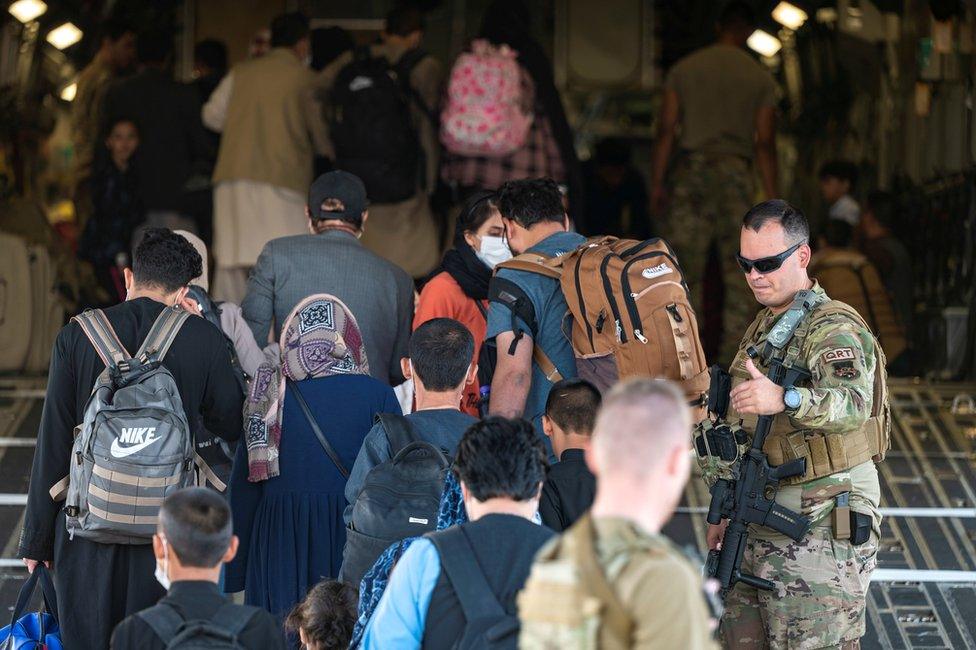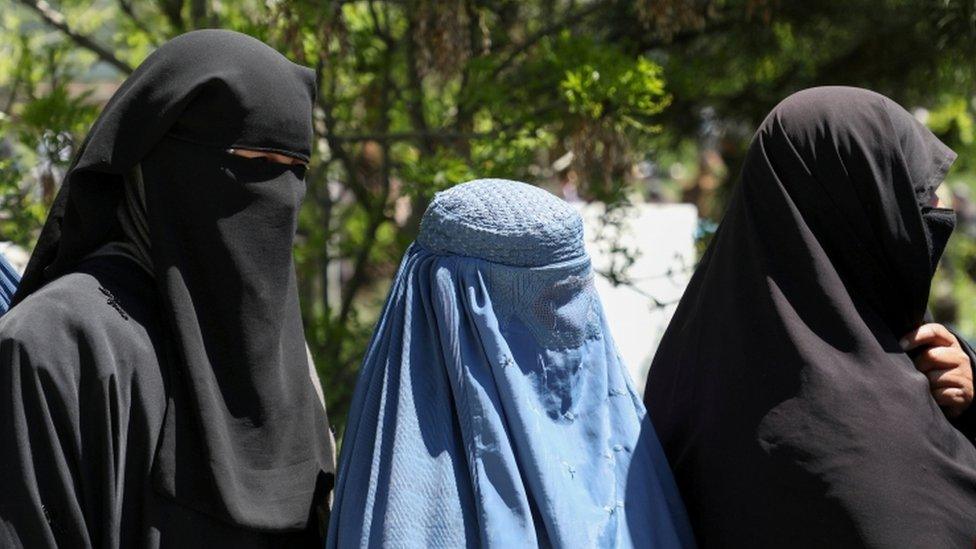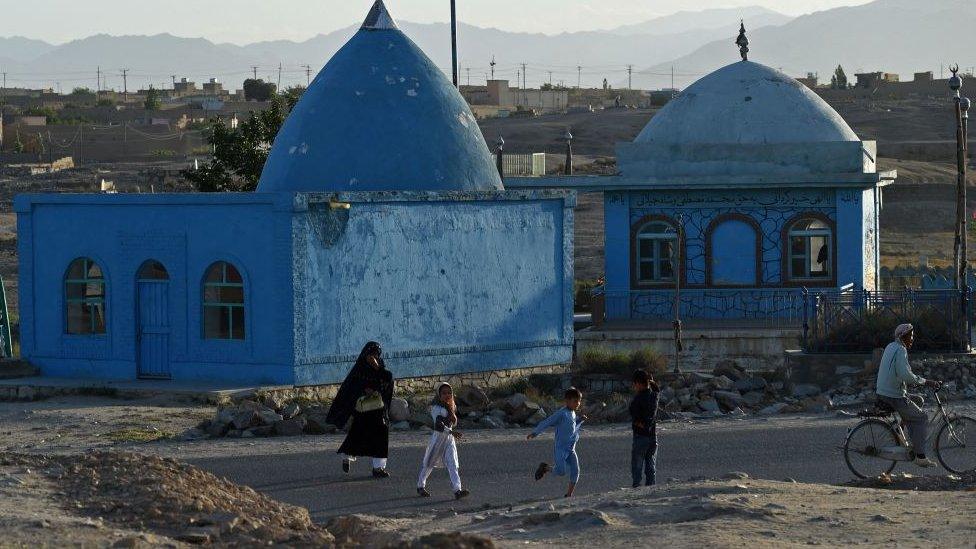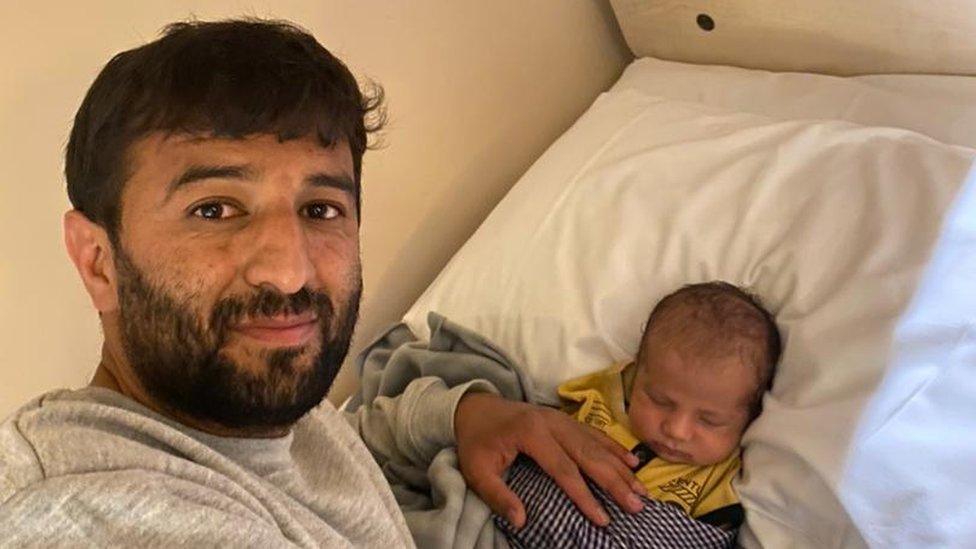Afghanistan: 'The sooner we finish, the better,' says Joe Biden
- Published
Biden: 'Taliban helping us get people out of Afghanistan'
US President Joe Biden says the US is "on pace" to meet a 31 August deadline for evacuations, despite previous calls from allies for an extension.
"The sooner we finish the better," he said. Some American troops have already been withdrawn, US media report - although evacuations are not affected.
At least 70,700 people have been airlifted from Kabul, which fell to the Taliban nine days ago.
The militants have opposed any extension to the evacuation deadline.
President Biden said: "The Taliban have been taking steps to help get our people out," adding that the international community would judge the Taliban by their actions.
"None of us are going to take the Taliban's word for it," he added.
Mr Biden said the airlift had to come to an end soon because of an increasing threat from the Islamic State group in Afghanistan.
The longer the US stayed in the country, he said, there was an "acute and growing risk of an attack" by the group.
In other developments:
The World Bank halted funding for projects in Afghanistan. It cited concerns over how the Taliban's takeover would impact the country's development prospects, especially for women
The World Health Organization warned there were only enough medical supplies in Afghanistan to last a week. It said attempts to deliver medical supplies had been blocked due to restrictions at Kabul airport
Accommodation website AirBnB promised to provide temporary lodging for 20,000 refugees at no charge to help them resettle across the world
Russia is to use four planes to evacuate more than 500 people, both its own citizens and citizens of other ex-Soviet states, from Afghanistan


A bitter disappointment for many in Kabul
The staffers were punctual: they moved velvety ropes from a briefing room to the Roosevelt Room, and got ready for the president's speech at 12:00 (16:00 GMT).
They set up a sound system, and prepared the stage for an important moment: the president would speak about Afghanistan. But the president was late. He met aides in the Oval Office, worked on his speech.
"What's going on?" my colleagues asked, sending me texts, wondering what was happening, and why his speech had been delayed, again and again.
They were not the only ones who were wondering: many people in Kabul were desperate to find out.
Finally, the president spoke at around 17:00, hours late: things were on track to end the US mission by 31 August, he said.
His remarks were a bitter disappointment for many in Kabul, who say the mission is far from over, since it leaves them stranded.
Backstage at the White House, the president's day, and the lead-up to his speech, were disorganised, unpredictable and chaotic.
For many, it captured the essence of his Afghanistan policy, one that they describe as disastrous.

Mr Biden was speaking after leaders of the G7 - which consists of Canada, France, Germany, Italy, Japan, the UK and the US, plus the EU - discussed the Afghan crisis during a virtual meeting. The UK and other allies had urged the US to stay beyond 31 August to allow more relief fights.
UK Prime Minister Boris Johnson, who chaired the talks, said Britain would continue to evacuate people "until the last moment". He also urged the Taliban to allow Afghans to leave beyond the deadline.
European Commission President Ursula von der Leyen said the G7 leaders had "agreed that it is our moral duty to help the Afghan people and to provide as much possible support as conditions will allow".
Almost 6,000 US soldiers and more than 1,000 from the UK are at Kabul airport to secure it and organise the evacuation of foreigners and eligible Afghans.

The evacuation continued at Kabul airport on Tuesday
Smaller contingents from other Nato members including France, Germany and Turkey are also present.
The airlift is being stepped up, with more than 21,000 people evacuated since Sunday. The departure of some US troops ahead of the 31 August deadline "does not affect the mission", a US defence official was quoted as saying by CNN.
On Tuesday, two members of Congress flew into Kabul airport unannounced, prompting an outcry on social media. Democratic Senator Seth Moulton and Republican Senator Peter Meijer were on the ground at Kabul airport for several hours, external, according to the Associated Press.
Allow X content?
This article contains content provided by X. We ask for your permission before anything is loaded, as they may be using cookies and other technologies. You may want to read X’s cookie policy, external and privacy policy, external before accepting. To view this content choose ‘accept and continue’.

Sources told the agency the state department, defence department and White House officials were furious about the visit as it had been made without co-ordinating with diplomats or military commanders.

Uncertain and chaotic
By Yogita Limaye, BBC News, Mumbai
People involved with evacuation efforts have told the BBC that some Afghan nationals who have tried going to the airport since the Taliban announcement have been stopped at checkpoints. It is not clear who they're being denied entry by.
Given the crowds thronging the airport, it has been tough all through the past week for people to get past its gates, but the situation has become even more difficult now.
The BBC has also learnt that some Afghans who were due to leave on Wednesday morning have abandoned their plans for now, fearing for their safety on the road to the airport, nervous after the Taliban said they didn't want Afghanistan's people to leave.
Evacuation flights are taking off every hour, but there are fears now that some planes might have to leave without the people they were meant to fly out.
The US has said it is in touch with at risk Afghans they plan to evacuate, but the situation on ground is uncertain and chaotic.

Earlier on Tuesday, Taliban spokesman Zabihullah Mujahid said the group would probably not agree to an extension and Afghans would be stopped from going to the airport.
"There is danger that people will lose their life" in the chaos there, he told reporters.
However, there has been confusion about whether this meant Afghans with full travel documents would be unable to leave the country.

Mr Mujahid also said that working women in Afghanistan must stay at home until proper systems are in place to ensure their safety.
"Our security forces are not trained [in] how to deal with women - how to speak to women [for] some of them," he said. "Until we have full security in place... we ask women to stay home."
The Taliban enforced a strict version of Islamic law when they ran Afghanistan before 2001. Since their return to power, they have tried to convey a more restrained image, promising rights for women and girls and some freedom of speech.
But UN Human Rights Commissioner Michelle Bachelet said there were "credible" reports of human rights abuses by the Taliban, including summary execution, restrictions on women and recruitment of child-soldiers.
The UN Human Rights Council on Tuesday endorsed a resolution affirming its "unwavering commitment" to the rights of women and girls.
But the resolution did not recommend the appointment of a special UN investigator for Afghanistan, which many human rights groups had called for.

Are you in Afghanistan or do you have a loved one there? Please tell us your story by emailing haveyoursay@bbc.co.uk, external.
Please include a contact number if you are willing to speak to a BBC journalist. You can also get in touch in the following ways:
WhatsApp: +44 7756 165803
Tweet: @BBC_HaveYourSay, external
Please read our terms & conditions and privacy policy
If you are reading this page and can't see the form you will need to visit the mobile version of the BBC website to submit your question or comment or you can email us at HaveYourSay@bbc.co.uk, external. Please include your name, age and location with any submission.
- Published20 August 2021

- Published24 August 2021
